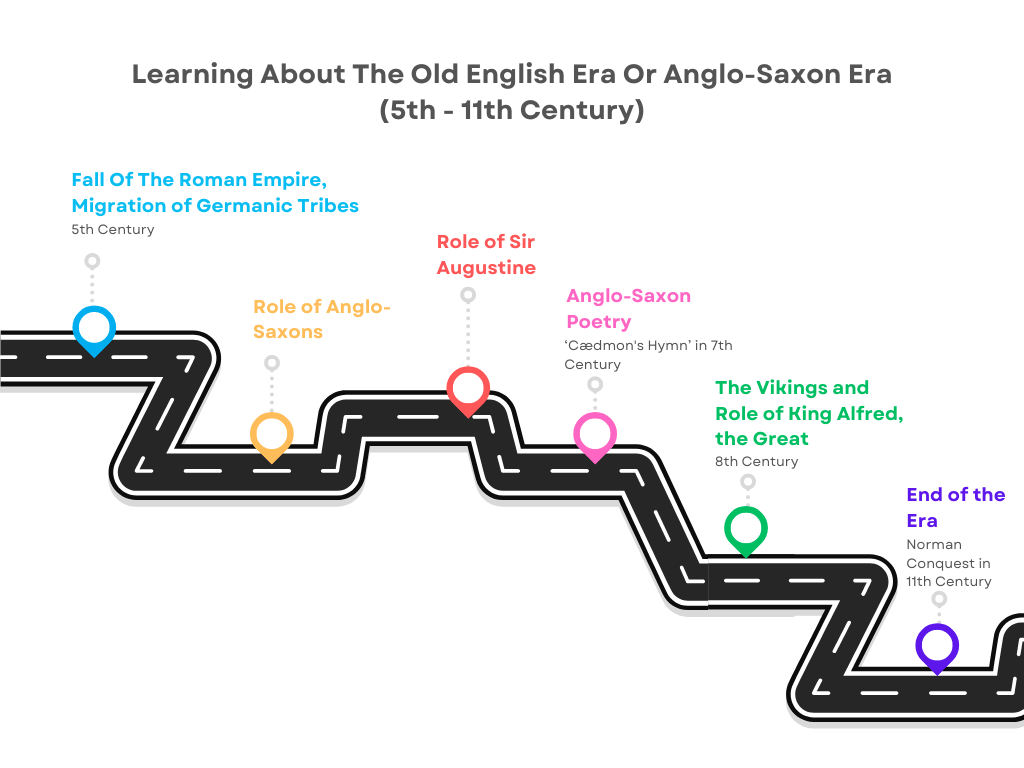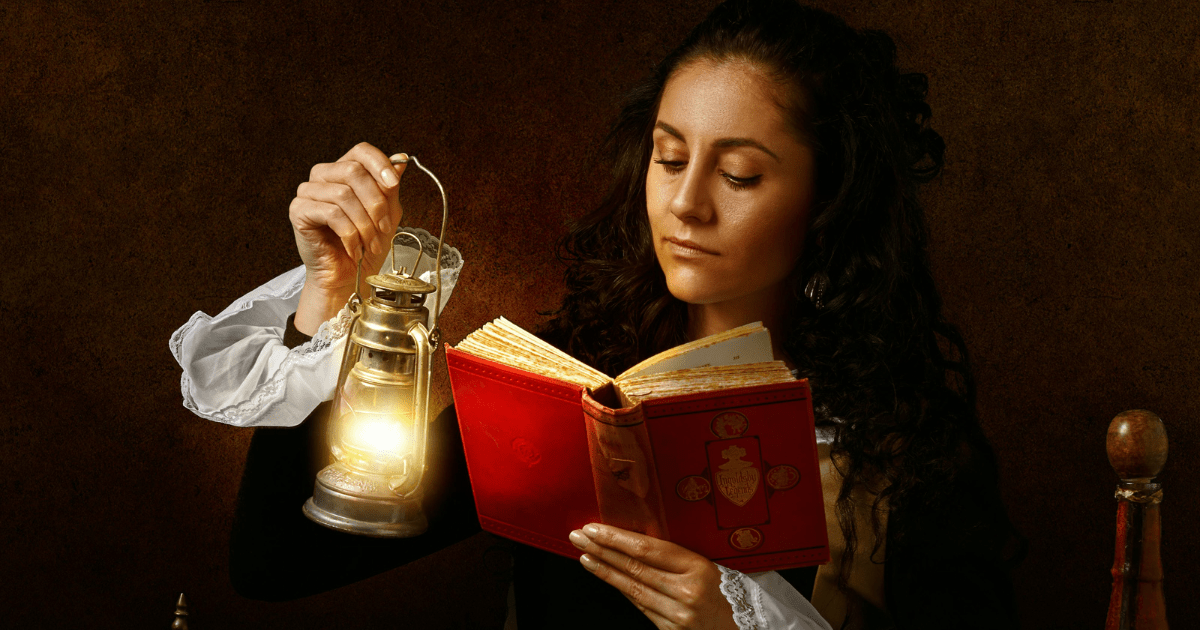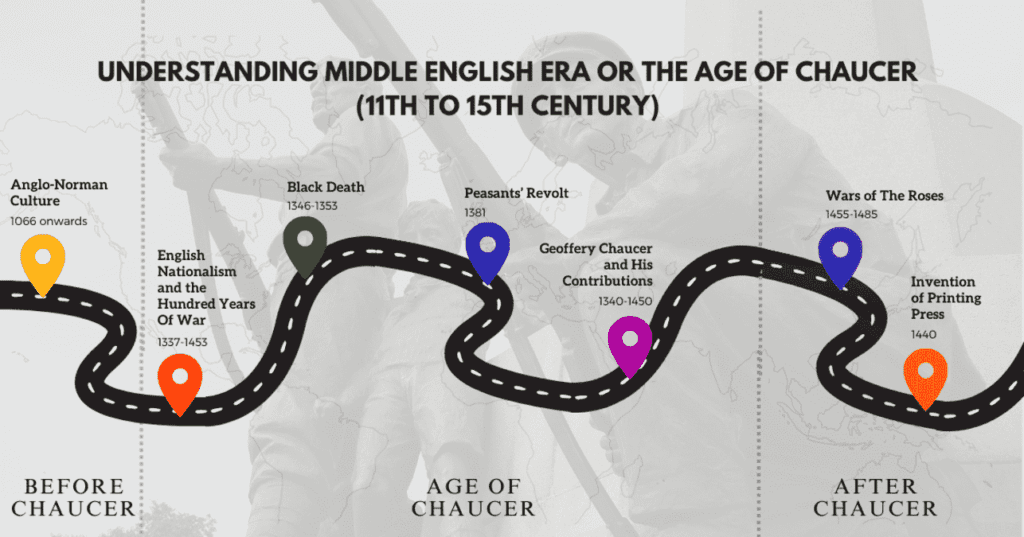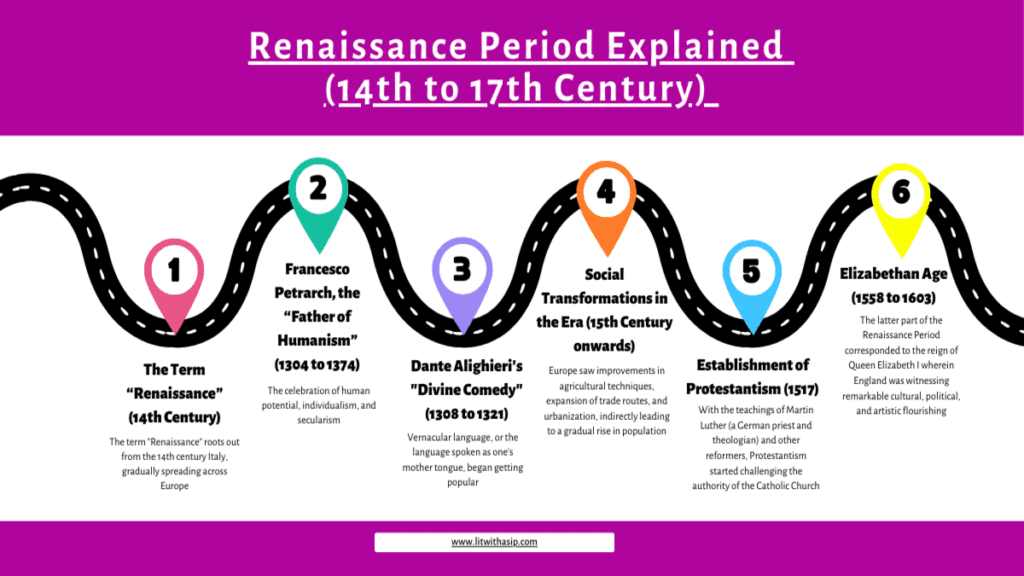The Old English Era, or Anglo-Saxon Era, presents the earliest form of written literature in the English language. Spanning from the 5th to the 11th century, this era encompasses literature written in Old English, which was spoken in Early Medieval England. This era is the first one that needs to be studied to understand English literature. And, it is hardly possible if we do not understand the historical timeline of how various events fell into place before and during the Anglo-Saxon period. So, before we learn about what happened during this period, let us first learn about what existed before it…
The Anglo-Saxon period witnessed extensive transformation on all levels. Geographical, political, literary, religious, and historical changes make it worth reading and learning about. At its best, this period deals with the formation, realization, and ultimately the development of the English identity. It shows how British history grows through the chaos, revealing resilience amidst adversity.
This article delves into various stages coming together to describe the Old English Era. Read through to grasp the entire picture:

What Existed Before The Anglo-Saxon Era?
We are here talking about English literature, that plainly means a literature written in the English language. But what languages were spoken on the island of Britain before English? The answer is Celtic and Latin, majorly spoken languages in Britain before the 5th century. The Celtic language was spoken by the tribe called Celts who had been living in Britain way before the Romans arrived. It is believed that Britain was named after the Celts as they were also known as the ‘Britons’. Celts are regarded as the original Indo-European inhabitants who developed their own culture in Britain and spread through neighboring countries like France, Ireland, and Spain.
On the other hand, Latin is another important language to learn about here. It came up as a chief source of communication in the military and governmental spheres of Roman Britain. It was exclusively used by the upper or noble class people, separating themselves to the tribal population of Celts. The Romans, who had reportedly ruled over Britain from 43 to 410 AD after the invasion of Emperor Claudius, established their own Roman Empire here and conquered most of the British island.
People might think why did the Celts not expel the Romans from making such changes in their way of living and culture? This has happened in almost every instance of conquering in history. So yes, there was initial reluctance but over time, the Celtic populace accepted Romanization. Not all Celts were fine with having the Roman rule over them. While some fiercely rejected it, others adapted and even thrived under it.
Romans came with the motive of propagating Christianity in the face of already-existing Celtic religious beliefs. They taught the Celtic population how to read, write, and speak the Latin language- a language with immense global recognition to date. You must have also heard about the Roman numeral system, wonder where they came from? The Romans, themselves. There were changes in the way things and distances were measured with the introduction of concepts like miles and inches.
There were also significant changes in the architecture and roads. A prime example of this is the Hadrian’s Wall- a defense fortification against the Picts (a Scottish tribe that existed from the 4th to 9th century AD) whose construction began in 122 AD, under the reign of Emperor Hadrian. Romans also introduced changes in farming techniques to ensure more output and productivity in the face of unplanned resource exploitation. Some of these methods are extensively applied to date- including, crop rotation, grafting and budding, plowing, use of mills, and more.
Even after a glorious ruling period of about 370 years, the Romans had to flee from Britain and return to mainland Europe as the empire was falling apart. Even though the Romans gave so much to the once-Celtic Britain and left an unforgettable legacy remembered till date, they left Britain exposed to the continued attacks from the Picts. At that time, the rule of Emperor Honorius prevailed, and even he refused to assist the Celtic people left behind.
Fall Of The Roman Empire and Migration of Germanic Tribes
With the fall of the Roman Empire, once a dominant political party of Europe that peaked in the 2nd century, Celts in Britain were left with no devices. Ultimately, they had to seek help from the Germanic tribes of Angles, Saxons, and Jutes. Due to these occurrences, these tribes migrated and settled in Britain in the 5th century. The relationship between the Germanic tribes and the falling Roman Empire is complex and multifaceted. It would not be accurate to categorize these Germanic tribes solely as victims or proof of the fall of the Roman Empire. It would be more accurate to see them as someone playing a significant role in the after events that had led to the decline and eventual collapse of the Western Roman Empire. While the Jutes could not make it for much time, Angels and Saxons prevailed for a significant period. This is certainly how the era in discussion got its name.
Germanic tribes, in search of a new land, caused significant changes in 5th century Britain where the power of the Roman Empire had already waned. The favorable power vacuum allowed the Anglo-Saxons to establish their place in Britain as a distinctive ethnic group. Please note that these tribes, coming from the northern part of that time’s Germany, spoke Old English. Also, it was after the name of the German tribe ‘Angles’ that the language ‘English’ got its name. Angles are also responsible for giving a name to England, which was established as a kingdom in the 10th century. Also, the Anglo-Saxons formed individual kingdoms, such as Essex, Sussex, Wessex, Mercia, Northumbria, Kent, East Anglia, and Middle Anglia. To expand their territories, they often engaged in battles and formed political alliances. This also impacted their influence and control over British land.
If you wish to delve deeper into this topic, you may read Bede’s account of ‘Ecclesiastical History of the English People‘ published in AD 731.
What was the Role of Anglo-Saxons
It is believed that the Anglo-Saxons were the main contributors to English Literature. Post the settlement, they continued to pass along their tribal history and cultural values to generations and populations that did not know how to read or write. The role of storytelling was paramount, as the literature passed on from one generation to the other through word of mouth. The written way of communicating was not much practiced at this point in time. Even when the Anglo-Saxons began to write, they did so by learning about the Roman alphabets.

Hence, Anglo-Saxon literature began through spoken verse, songs, and poems, such as epic poems. These spoken verses helped in maintaining the continuity and cohesion of the tribal community and their cultural values. This corresponds to how literature has been instrumental in preserving numerous sentiments and values for various communities and ethnic groups. Gradually, they came up with their written works, which primarily included certain translations of the Bible, sermons, riddles, chronicles, and more. Notably, only 400 of such manuscripts have survived up to date. Most of the written manuscripts were lost during invasions by the Danes and even during the Dissolution of the Monasteries by Henry VIII that took place in 1536.
Role of Sir Augustine
Augustine of Hippo or Saint Augustine (354-430) is remembered as a great philosopher who made a significant impact in the Old English Era. He is also known for converting England to a Christian Nation in 597 AD as a part of the Gregorian Mission. He first approached the land of Britain through King Ethelbert, a pagan ruler, and his kingdom. Fortunately, through the influential role of the King’s wife, a Christian princess of Frankia, Saint Augustine’s mission met with success.
The Word of God was spread across England through the unwavering efforts of Augustine. Christianization had a huge impact on shaping the nation. All of this started being reflected through the art, literature, and governance of Anglo-Saxon society. The following points reflect on Christianization and conversions at that time:
- The first and strongest instance that proved the power of Christianization in the Old English Era involved the baptism of King Ethelbert around 600 AD.
- The missionary movement first began as a Gregorian mission which was a huge success. Additionally, by the time the last missionary died (reportedly, in 653 AD), Christianity had spread to the southern Anglo-Saxons too.
- Various kings converted to gain access to power and ensure legitimacy.
- Religion also became a way to bring forth alliances as it provided a common ground for beliefs and thus, friendships. These friendships were strengthened further through marriages, too.
- For many aristocratic women, converting was a means of gaining power in the religious communities.
- Anglo-Saxon missionaries later spread Christianity to the Frankish Empire (towards the 8th century). Furthermore, they spread it through the pagan regions of European continent.
Therefore, Christianity had a significant role to play in the Old English literature. It brought reading of the Bible to limelight. The Bible, first written and read in languages like Hebrew, Aramaic, and even Latin, was now being translated and preached in English words. New words were also invented at this point. Some examples include words, such as the ones used in the Church- apostle, bishop, priest, monk, and more. The concepts of ‘Heaven’, ‘Hell’, and ‘God’ came into being. Native words were modified to fit the newer standards of language and shift away from the earlier pagan way of life.
Anglo-Saxon Poetry
Old English Poetry can be divided into three categories: Heroic Poetry, Lyric Poetry and Christian Poetry. Heroic Poetry emphasized courage and valor by describing the tales of great warriors and rulers. Lyric Poetry looked into what was inside, that is, personal emotions and feelings. Christian Poetry came as a result of expanding Christianity in England at that time, describing Christian beliefs and teachings.
The first-ever Old English poetry ‘Cædmon’s Hymn’ was composed in the 7th century. The term ‘Hymn’ is quite descriptive of the work’s nature. This written work was a short Old English poem that served as a song of praise to God. This work narrated the tale of God and his making of heaven and earth for man’s enjoyment.
‘Widsith’ (also called, ‘The Traveller’s Song’) is considered to be one of the earliest works. This work could best be regarded as a survey of people, kings, and heroes of the European continent during the Heroic Age of Northern Europe. It provides an insight into the Germanic world of that era. But, this work has been found only in bits and pieces. However, this does not affect the importance of its existence.
If one talks about a work that has existed from that period till now in proper shape, one may consider ‘Beowulf’. It is not only complete and preserved, but also one of the longest poems ever written with about 3182 lines. It is about a Scandinavian hero, who fights with monsters and becomes a king, leaving almost no space for the heroic essence to escape. Beowulf is also regarded as the ‘national epic poem’ of England. There is a rich use of the poetic device ‘alliteration’ in this poem, ensuring a lasting impact in the readers’ minds. Notably, Beowulf’s writer’s name remains unknown to date. The writer is simply referred to as ‘Beowulf’s Writer’.
For most works of the Old English Era, the authorship remains quite unknown. This might be attributed to the fact that the writers prioritized spreading their message over seeking recognition for their work. They were unaware of what the fields of writing and literature would become in the future, so it is possible for them to just not care about the work’s credit. Reasonable enough, I suppose. Additionally, there was a lack of extensive documentation or author’s signatures. Loss and damage of many historical documents have further complicated tracking the record.
Some of the other works that earned notable recognition are Genesis, Exodus, The Wanderer, Wife’s Lament, Husband’s Message, Christ and Satan, The Dream of the Road, and The Battle of Maldon.
The Entry of the Vikings and Role of King Alfred, the Great
In the 8th century (or the Viking Age), numerous unorganized but hugely affecting encounters were witnessed in the villages of England. Vikings, the seafarers who originally hailed from Scandinavia, undertook the task of trading throughout Europe in the Middle Ages. Amongst the many countries that they invaded and settled in, England tends to be one of the firsts. The coastal areas were their main targets, especially the ones seated next to the European rivers and England’s coast.
A lot of robbery was witnessed that affected the society and their cultural habits. King Alfred of Wessex (often regarded as Alfred, the Great), through his plan of unifying England, was successful in resisting the Viking attacks. He undertook various military and political measures to safeguard Wessex from the invasions. He promoted literacy and education and introduced the Anglo-Saxon Chronicles. He negotiated with the Vikings and his strategies did not only safeguard his people but also helped in unifying the whole diverse society. Gradually, the Vikings assimilated amongst the locals of the place and got Christianized, settling down in Normandy.
End of the Era
In the 11th Century, William the Conqueror (often called William the Bastard) conquered England, establishing the rule of Normans while discarding that of the Saxons. This event is known as the Norman Conquest of 1066 in the pages of history. Defeating the Saxon King Harold II in the Battle of Hastings, William the Conqueror was able to establish Norman rule in England, marking the beginning of the Middle Ages.
The Norman Conquest is often termed as the first ever biggest conquest in England that brought numerous political and social transformations. The Norman aristocrats were replacing a lot of Saxon elites. Feudalism came to life with William the Conqueror’s followers getting favoritism in land reforms. The Saxon society was almost being treated like an outcast under Norman rule.
English culture and architecture were hugely impacted. Norman French was made the official language of the ruling class while English was downgraded to the language of the common people. The power of Normans consolidated after the introduction of the Domesday Book in 1086, a comprehensive survey of landholdings and resources in the nation.
On the other hand, co-existing dual cultures also gave rise to “Anglo-Norman” culture. England was exposed to a more international European culture, majorly dominated by French literature and sensibilities.
Conclusion
At last, the Old English Era laid the foundation for the development of English society, culture, and institutions, forever shaping the narrative of British history. It has defined Old English to be the literary base, something that was instrumental in kicking it all off. Expansion of literary richness and most importantly, the beginning of writings as they happened, has made the Old English Era an important epoch in the evolution of English Literature.

Jennis Jacob, a passionate literary enthusiast in her 20s, is a writer and poet. With eight years of experience in literature, she is currently a master in English and finds inspiration in Womanist, American, and Indian Partition Literatures. Her works have appeared in anthologies such as ‘Carved Words Of Creative Minds’ and ‘100 Splendid Voices,’ and she is working on upcoming books. Through LitWithASip, she aims to ignite a love for literature and empower individuals to embrace their true selves.


Only wanna input that you have a very decent site, I like the style and design it actually stands out.
Thankyou for this post, I am a big fan of this internet site would like to go along updated.
Appreciating the commitment you put into your blog and detailed information you provide. It’s nice to come across a blog every once in a while that isn’t the same outdated rehashed material. Great read! I’ve bookmarked your site and I’m adding your RSS feeds to my Google account.
Saved as a favorite, I really like your blog!
Lovely just what I was looking for.Thanks to the author for taking his time on this one.
Very nice pattern and excellent content, very little else we require : D.
I’ve been absent for a while, but now I remember why I used to love this web site. Thanks , I¦ll try and check back more often. How frequently you update your site?